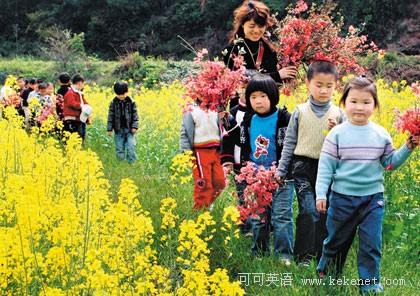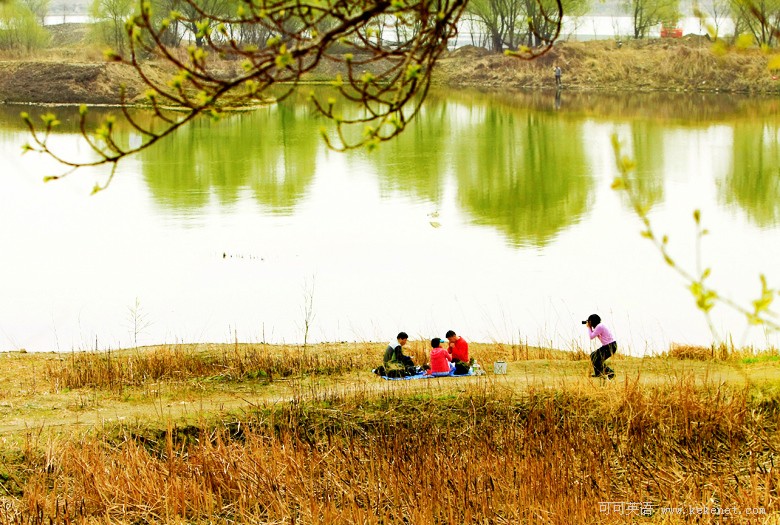(单词翻译:单击)
春天在哪里呀春天在哪里,春天在那冰雪融化的小河边,在那红杏枝头春意闹的山间小道,春天在“忙趁东风放纸鸢”的孩子的脸上。春天来了,你会让孩子参加春游活动吗?
This is a famous Chinese children's song called "Where is the Spring?" The rhyme goes: Where is the spring? The spring is in the mountains and forests. There, it has red flowers, green grass and ringing birdies.
But it seems now such springtime scenes can only be found in children's minds and adults' memories.
With elementary and middle schools growing larger and many having more than 1,000 students, organizing group activities has become a tough issue for teachers. And as schools are responsible for students during school time, they cannot afford to take a chance on any unexpected accidents occurring in group outings.

As a result, almost all elementary schools in recent years have canceled their spring outing plans to avoid the risks.
But students see it differently.
"Spring outings are good for our health, and it's a good opportunity for us to communicate with our classmates and teachers."
"On the one hand, students can learn about the teamwork spirit during spring outings; and on the other hand, they provide good exercise for our bodies. I think the security problem can be solved if the school pays close attention to the issue. We can't give up eating for fear of choking. It is the same for spring outings. We can't give them up for fear of the security."
The safety issue is also the one that concern parents the most. But many of them say they are not opposed to extracurricular activities such as spring outings.
"Excursions are good for the students both physically and psychologically. But the school must have a sound plan in all aspects, especially security.""We are against activities that lack good planning-those blind ones."
At the end of February, the Ministry of Education published a document entitled "State Guidelines for Medium- and Long-term Educational Reform and Development Plan." It is now open to opinions and suggestions.
A middle school student named Li Shen wrote to the ministry suggesting that the guidelines include a stipulation that schools cannot abandon outdoor group activities for safety sake.

"The responsibilities when group activities are organized by schools should be made clear, such as in which circumstances the schools have impunity and what kinds of safety precautions are required."
Li Shen is a student at the Second High School Attached to Beijing Normal University. He is also the leader of student environmental club. He plans to organize a trip for the club members to go to the Beijing suburbs to plant trees. He says it will be a good way to educate teenagers about living low-carbon lifestyles.
But school administrators have cancelled the trip. Li says that he believes it was because of safety concerns.
"Security concerns are the priority. We are not adults so to that extent, we can't be expected to think of every issue. And the school as the organizer takes the biggest responsibility."
Li and his schoolmates have no choice now but to abandon their outings. But hopefully, things can be changed. Last year, some provinces and municipalities such as Shanxi and Tianjin adopted school liability insurance in primary and middle schools as well as vocational schools. The insurance covers all school activities, including spring outings, laboratory courses and gym classes. Students enrolled in nine-year compulsory education are required to sign up for the insurance, and the schools are asked to pay the insurance fees.
In many other countries, school activities such as spring outings are encouraged and are an important part of education. For instance, in Singapore, primary and middle school students have a week of spring holiday for outing activities or group travel. In South Korea, short-term study tours in foreign countries are common. All these activities are an extension of and supplement to indoor classes and textbooks.
Some teachers say it's easy to see the positive side of spring outings from the children's faces. Those words and the description cannot come from the classroom, but from nature.
Middle school teacher Chen Guozhi says rules and responsibilities regarding class outings must be nailed down, and schools must clearly understand those rules in detail.
"All the rules must be further detailed and whenever there is an accident, how to share the responsibility is another important issue that concerns the school. Does the school have to take full responsibility? Students of different ages have different abilities to foresee the results of their behaviors. So the law should consider that the students themselves and parents also have relevant responsibilities when it comes to safety education."
With China's one-child policy, parents treasure their single children greatly. And schools don't want to take any risk of something happening to them. That means the students' right to a spring outing might be taken away.
But mandatory insurance policies, sound safety precautions for emergencies and experienced teachers may resolve the problem.


